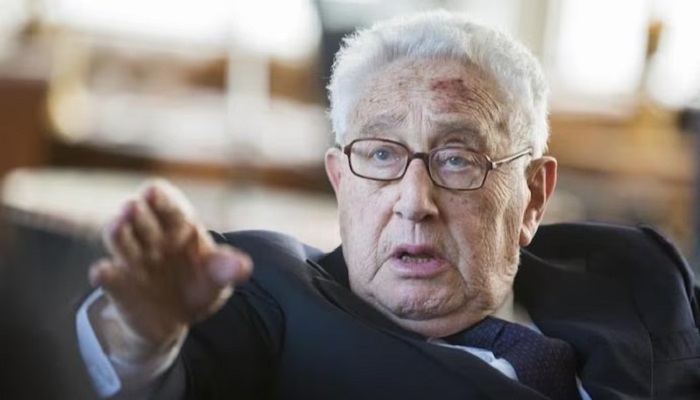The tragic reality is that Kissinger, having evaded justice, demonstrated that the powerful can escape accountability for millions of lives lost

In the twilight of history’s conscience, Henry Kissinger, the orchestrator, bystander, and occasionally, the unapologetic architect of some of the United States’ most egregious war crimes, took his final bow on Wednesday at the age of 100.
Some call his era a hundred years of “duplimacy”
As the curtain falls on a century of life, it leaves in its wake a complex legacy, marked by the shadows of atrocities and the echoes of diplomatic decisions that continue to reverberate through the annals of American foreign policy.
In the aftermath of his demise, media outlets worldwide offered a spectrum of obituaries, with some dubbing him “controversial” and others extolling his legacy.
However, amidst efforts to sanitise Kissinger’s legacy, it is imperative not to lose sight of the man he truly was.
Kissinger, through his actions, bore direct responsibility for the deaths of three to four million people during his eight-year tenure from 1969 to 1977, according to Yale University historian Greg Grandin’s book, “Kissinger’s Shadow.” His policies set the stage for the enduring wars that followed.
Recognized as the architect behind US efforts to curb Soviet and communist influence globally, Kissinger advocated a “bombs over diplomacy” approach, endorsing some of the most brutal bombing campaigns in modern history.
During the Vietnam War, this approach involved carpet bombing not only Vietnam but also neighbouring Cambodia, where both Cambodian and Vietnamese guerrillas operated.
Kissinger’s approval of 3,875 air raids within the first year, dropping 540,000 tonnes of bombs in Cambodia, led to lasting consequences, with innocent lives still claimed by unexploded ordnance.
The carpet bombing failed to prevent the ascent of Vietnamese and Cambodian communists, with the Khmer Rouge winning in Cambodia and perpetrating a genocide.
Kissinger’s involvement in Southeast Asia earned him the Nobel Peace Prize in 1973, a bitter irony given his clandestine efforts to sabotage peace talks and his remorseless approach to achieving victory.
Kissinger’s transgressions extended beyond Vietnam and Cambodia. In South Asia, he supported Islamabad as it carried out a genocide in East Pakistan (now Bangladesh) to prevent a Soviet-leaning India from causing the collapse of a US ally.
Further afield, Kissinger greenlit the Indonesian invasion of East Timor in 1975, resulting in a genocide with over 200,000 casualties.
Throughout Latin America, Kissinger supported right-wing forces and coup plotters, contributing to the overthrow of democratically elected leaders and subsequent human rights abuses.
His influence in the Middle East saw him sabotaging peace proposals and displaying a shocking disregard for Jewish life. His callous words about Soviet Jews in gas chambers underscored his lack of empathy.
Even after leaving office, Kissinger continued advocating for death and destruction.
His role in the Bush administration’s decision-making during the Iraq War is particularly troubling, with his influence evident in the “shock and awe” strategy that caused civilian casualties.
Kissinger’s endorsement of Israel’s war on Gaza in 2023 further highlights his unyielding support for military aggression.
The legacy Kissinger leaves behind is a gruesome testament to the belief that violent imperial policies are justified in the pursuit of national interest.
As we witness ongoing conflicts, such as in Gaza, it becomes evident that this mindset persists within US officials.
The tragic reality is that Kissinger, having evaded justice, demonstrated that the powerful can escape accountability for millions of lives lost and still be lauded after a peaceful passing.
Credit:
1: https://www.geo.tv/latest/521402-henry-kissinger-a-hundred-years-of-war-crimes
The Mention Sources Can Contact is to remove/Changing this articles
